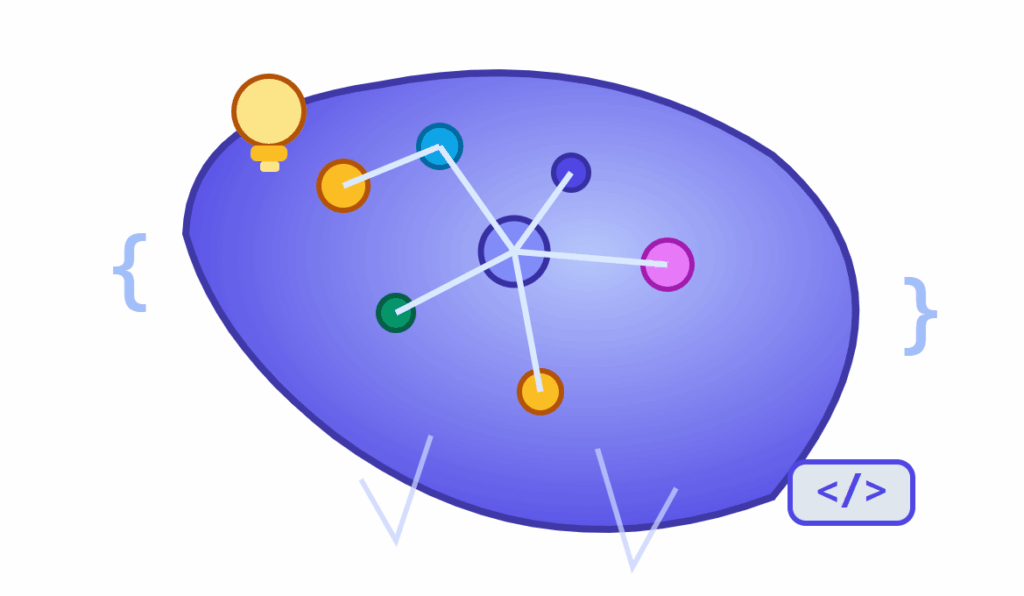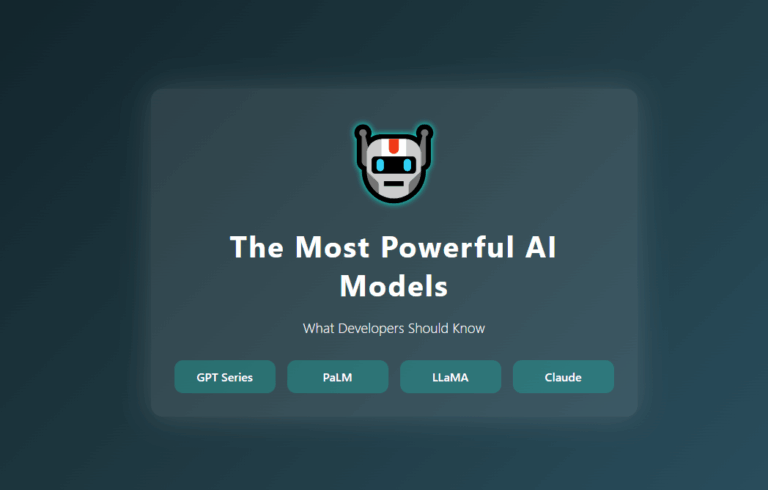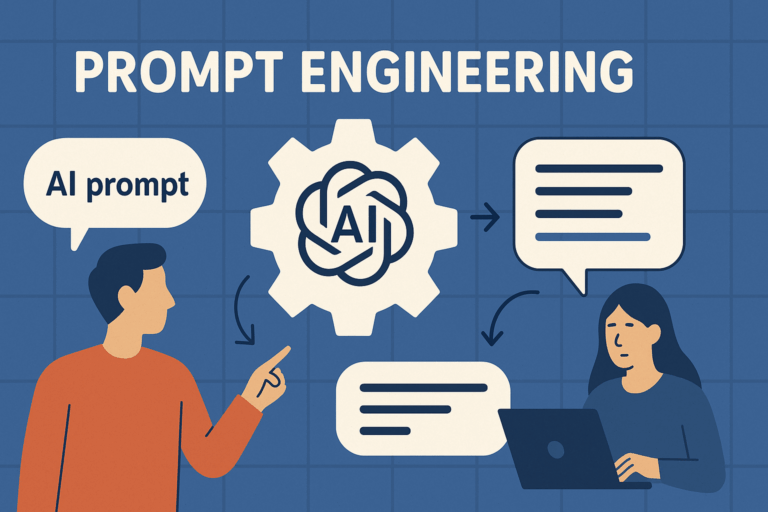Introduction to Artificial Intelligence (AI): What Every Developer Should Know
Artificial Intelligence (AI) is no longer just a buzzword—it’s a transformative force driving innovation across industries. From smartphones that recognize your face to algorithms that recommend your next show to watch, AI is everywhere.
For software developers, understanding AI is becoming as essential as knowing how to write code. This article introduces the core concepts of AI, its types, applications, and why it’s a must-have skill for modern developers.

What Is Artificial Intelligence?
Artificial Intelligence refers to the simulation of human intelligence in machines that are programmed to think, learn, and make decisions. It allows systems to process information, recognize patterns, and solve problems with minimal human intervention. In simpler terms, AI makes machines “smart” by enabling them to act like humans—or sometimes, even better.
AI encompasses a broad range of technologies and methods, from rule-based systems to sophisticated neural networks that mimic the way the human brain processes information.
Read more on this >>> The Most Powerful AI Models: What Developers Should Know
AI vs. Machine Learning vs. Deep Learning
Many people use these terms interchangeably, but they have distinct meanings:
- Artificial Intelligence (AI): The overarching concept of machines performing tasks that require human intelligence.
- Machine Learning (ML): A subset of AI that focuses on algorithms that learn from data.
- Deep Learning (DL): A specialized area of ML that uses neural networks with many layers (deep neural networks) to model complex patterns and make highly accurate predictions.
Types of AI
AI can be categorized into three major types based on its capabilities:
1. Narrow AI (Weak AI)
This is AI that is trained and designed for a particular task. It may outperform humans in that specific function, but it cannot do anything else. Examples include:
- Voice assistants like Siri and Alexa
- Recommendation systems on Netflix or YouTube
- Spam filters in email systems
2. General AI (Strong AI)
This AI would have cognitive abilities similar to a human being and could solve any problem, not just a specific one. This type of AI is still under development and largely theoretical.
3. Super AI
Super AI would surpass human intelligence in every field—scientific reasoning, creativity, general wisdom, and social intelligence. It remains a concept in science fiction and theoretical research.
Key Branches of AI
AI is a multidisciplinary field made up of several key areas:
1. Machine Learning
Allows systems to learn and improve from experience without being explicitly programmed. It’s used in:
- Predictive analytics
- Fraud detection
- Language translation
2. Natural Language Processing (NLP)
This enables machines to understand and respond to human language. Common NLP applications include:
- Chatbots
- Voice assistants
- Text summarization
3. Computer Vision
Allows machines to interpret and make sense of visual information from the world. It powers:
- Facial recognition
- Self-driving cars
- Medical image analysis
4. Robotics
Combines AI with mechanical components to build intelligent physical systems that can perform tasks autonomously.
5. Expert Systems
Rule-based AI that mimics human decision-making using a predefined knowledge base. It is commonly used in areas like healthcare and finance.
A Brief History of AI
1950s–1960s: Birth of AI
- Alan Turing proposed the idea of machines thinking like humans.
- John McCarthy coined the term “Artificial Intelligence” in 1956.
1970s–1980s: AI Winter
- Funding and interest dropped due to high expectations and limited computing power.
1990s: Renewed Interest
- IBM’s Deep Blue defeated world chess champion Garry Kasparov in 1997.
2010s–Now: AI Revolution
- The explosion of big data, advanced algorithms, and powerful hardware brought breakthroughs in deep learning, computer vision, and natural language processing.
Real-World Applications of Artificial Intelligence
AI is transforming how industries operate and solve problems:
Healthcare
- AI diagnoses diseases using imaging data
- Virtual health assistants support patient care
- Predictive models monitor health trends
Finance
- AI-powered bots assist in customer service
- Fraud detection systems analyze transaction patterns
- Robo-advisors offer investment advice
E-commerce
- Personalized product recommendations
- Smart chatbots for customer queries
- Inventory and supply chain forecasting
Transportation
- Self-driving cars
- AI-powered traffic systems
- Route optimization for logistics
Education
- Intelligent tutoring systems
- AI-assisted grading
- Personalized learning experiences
Ethical Considerations in AI
As powerful as AI is, it raises important ethical and social issues:
1. Bias in Artificial Intelligence
AI systems can reflect the biases present in their training data, leading to unfair or harmful outcomes, especially in hiring or law enforcement applications.
2. Privacy Concerns
Many AI systems require access to sensitive personal data. Ensuring user data is protected is a growing concern.
3. Job Displacement
Automation through AI could replace human jobs, especially those that are repetitive and data-driven.
4. Lack of Transparency
Many AI models, particularly deep learning systems, are “black boxes”—their decision-making process is difficult to interpret.
5. Regulatory Uncertainty
Governments and industries are still grappling with how to regulate AI responsibly.
Read more >>> Prompt Engineering: How to Get the Best from AI Models
Why Developers Should Learn AI
For software developers, learning AI is a strategic investment:
- Career Advantage: AI is one of the fastest-growing fields, offering high-paying and in-demand roles.
- Smarter Applications: Adding AI to your apps can boost user engagement and product performance.
- Innovation: AI enables developers to build intelligent tools that learn and adapt over time.
- Versatility: AI skills are transferable across industries—from fintech and healthcare to gaming and logistics.
Whether you’re building a chatbot, designing a recommendation engine, or working with IoT devices, AI can significantly amplify your impact.
Artificial Intelligence is more than just a trending technology—it’s a game-changer for the future of software development. As AI continues to evolve, the demand for developers who understand its principles and can apply them in real-world scenarios will keep rising. By mastering the basics of AI today, you position yourself at the forefront of tomorrow’s tech revolution.
If you’re ready to dive into AI, start by learning the fundamentals, experimenting with open-source tools, and applying AI models to your projects. The future is intelligent—and it’s already here.
Read more >>>



